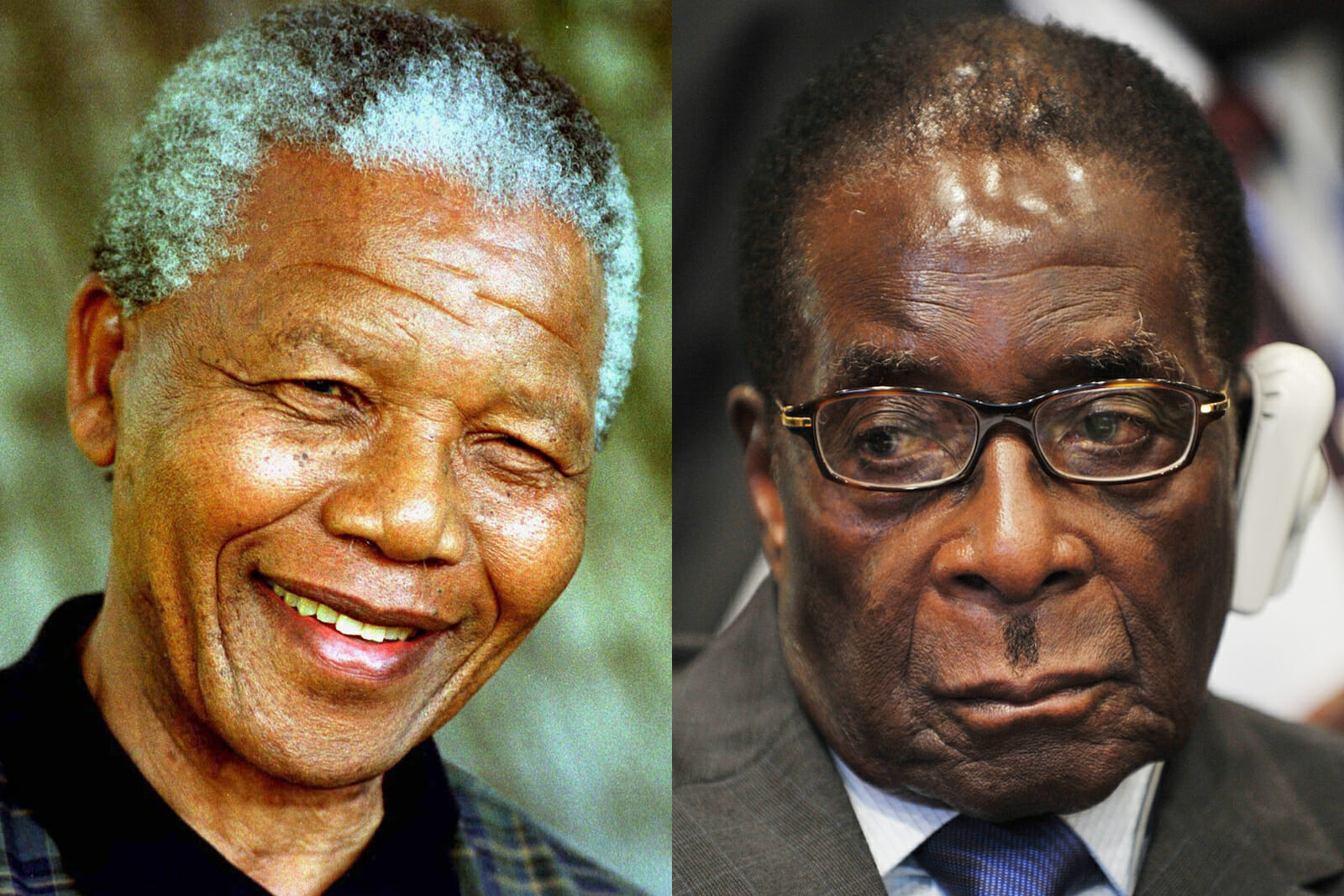
Mugabe and Mandela: Same Experiences, Different Paths
The careers of two of Africa’s most prominent politicians, Robert Mugabe and Nelson Mandela, have striking similarities. After Mandela’s passing and Mugabe’s “late” letter of condolences to Mandela’s family, a central question surfaces. How history will judge them and will historians be fair to both men since Mugabe, in a rare television interview this year, criticized Mandela for being too soft on South Africa’s white minority after the end of apartheid. Mandela on the other hand never criticized Mugabe openly. Mandela simply did not want to scare off investment by alienating the country’s former leaders, who dominated the economy. Experts on Southern African politics note that the two men had a strained relationship as they silently fought for relevance on the global stage.
Both were born in an era when white power prevailed throughout Africa, Mandela in 1918, Mugabe in 1924. Mandela and Mugabe were among that generation of African decision-makers whose reputations were forged in the struggle against colonialism or white minority rule. It was hard for many to let go of power, succumbing to the temptations of authoritarian control and its material spoils.
Both were products of the Christian mission school system, Mandela of the Methodist variety, Mugabe of the Catholic. Both attended the same university, Fort Hare in South Africa. Both emerged as members of the small African professional elite, Mandela a lawyer, Mugabe a teacher. Both were drawn into the struggle against white minority rule, Mandela in South Africa, Mugabe in neighboring Rhodesia. Both advocated violence to bring down white-run regimes. Both endured long terms of imprisonment, Mandela, 27 years, Mugabe, 11 years. Both suffered the anguish of losing a son while in prison and both were refused permission to attend the funeral.
It has been argued that Mandela used his prison years to open a dialogue with South Africa’s white rulers in order to defeat apartheid and Mugabe emerged from prison bent on revolution, determined to overthrow white society by force. However, few analysts note that Mugabe’s role was central in the 1980s reconciliation between blacks and whites in Zimbabwe. Mugabe has perhaps been somewhat discredited since he took principled stances on opposing apartheid rule and on racial reconciliation towards white Rhodesians in the new Zimbabwe. In this sense he somewhat preceded Mandela.
On the other hand, we should not also forget that despite its angry Marxist past and the fears expressed by the white minority, after winning the 1980 election Mugabe appeared as a model of moderation, pledging to work for reconciliation and racial harmony. Even the recalcitrant white leader, Ian Smith, who had previously denounced him as “the apostle of Satan,” now found him “sober and responsible.” In its first year of independence, Zimbabwe was awarded £900m in aid, enabling Mugabe to embark on ambitious programs of education and health development. The white population also benefited from growing economic prosperity.
But crucially and in sharp contrast with Mandela, Mugabe crushed his black political opponents in 1982 and in 1987. He established a one-party state and favored the military’s role in politics. It is quite true that the economy halted in the mid-1990s and the land reform program financed by Britain came to a halt when it was discovered that Mugabe was handing out farms intended for peasant resettlement to his own cronies. By 2000, Zimbabweans were generally worse off than they had been at independence: average wages were lower, unemployment had skyrocketed, public services were crumbling and life expectancy was falling.
Again, roughly during the same period, 1999 and 2000, the often-violent seizures of thousands of white-owned commercial farms by Mugabe loyalists disrupted Zimbabwe’s agriculture-based economy. After the farm seizures, Mugabe’s party demanded that companies not already owned by blacks yield 51 percent of assets and control. Zimbabwe, a former breadbasket, now relies on food imports. Mugabe after the emergence of the new opposition party the ‘Movement for Democratic Change’ (MDC) is charged with masterminding the killing of their supporters. Mandela on the other hand, stepped down in 1999 after a single five-year presidential term, during which he preached reconciliation. The decision not to seek a second term, a disappointment to his followers, fit with his insistence that leadership was a collective effort, not an individual one. It could also be seen as a message to other continental leaders who had opted to stay in power.
Furthermore, it was Mandela’s moral stature that made him more respected than Mugabe as he never had a Swiss bank account nor other excesses that come with ruling with an iron fist. Mandela never arrested a critic or anyone who disagreed with him. Many other leaders have labeled critics as “terrorists,” “saboteurs,” “counter-revolutionaries,” “colonial stooges,” etc. to be liquidated. One can even be jailed for saying that the president is not well.
Evidently, Mandela’s work is unfinished. President Jacob Zuma was acquitted of rape, but history will judge him harshly for his lack of leadership and judgment. Still, for all that, it is better to have the promise of democracy and transition than the bitter aftertaste of a revolution gone awry.

